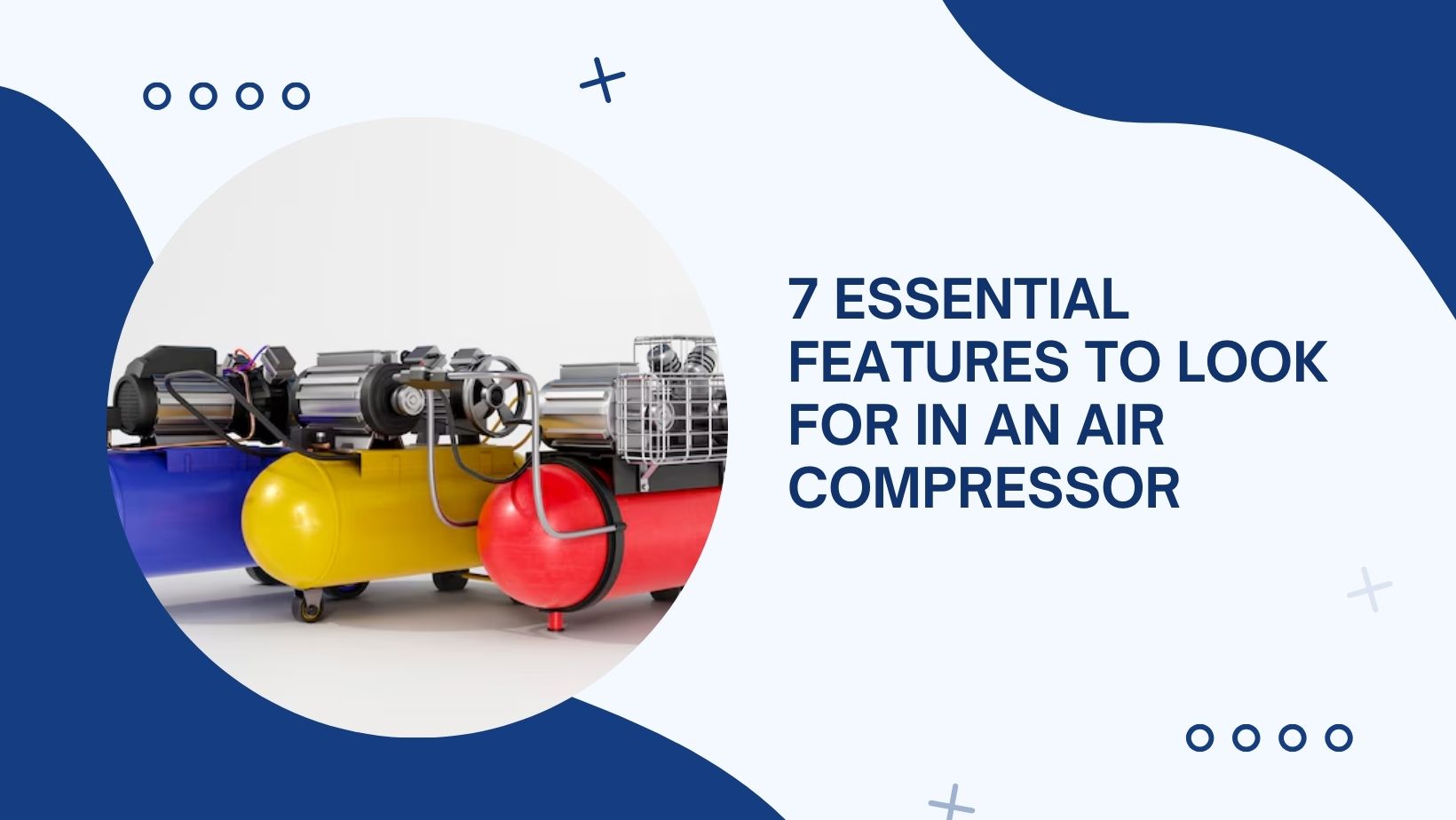Air compressors are indispensable tools in various industries, from construction and automotive to home workshops. They power tools, inflate tires, and operate machinery, making them essential for day-to-day operations. However, choosing the right air compressor can be a daunting task, especially with the numerous models available in the market. To make the process easier, it’s important to understand the key features that make an air compressor suitable for your specific needs.
In this article, we will discuss the seven essential features to look for in an air compressor. These features will help ensure that you make an informed decision and choose a compressor that is both reliable and efficient for your tasks.
Note: If you’re looking for a reliable Air Compressor in UAE, it’s crucial to choose one that meets both performance and energy efficiency. At Forte Oil Field Services, we provide top-quality compressors designed to meet your business needs. Reach out today to get expert advice and high-performance equipment that will help your operations run smoothly.
1. Size and Portability
What Does Size Matter?
When selecting an air compressor, the size is one of the first things to consider. The size determines how much space the compressor will take up and how easy it is to transport from one location to another. Depending on the application, you may need a compact, portable compressor or a larger, stationary one.
Portable Compressors for Small Tasks
For smaller tasks, like inflating tires, powering a few tools, or light home repairs, a portable air compressor may be sufficient. These compressors are lightweight and easy to move, making them ideal for home use or small projects.
Stationary Compressors for Larger Projects
On the other hand, if you’re working on large-scale projects in a commercial or industrial setting, a stationary air compressor may be a better option. These compressors are typically more powerful and can run multiple tools simultaneously. However, they are much heavier and less portable.
Choosing the Right Size for Your Needs
To make the best choice, consider the tasks you will be performing and the space where you’ll be using the compressor. A portable compressor is great for mobility, but if you need to run heavy-duty equipment or operate multiple tools, a larger, more powerful model might be necessary.
2. Air Pressure (PSI) Capacity
What Is PSI and Why Is It Important?
PSI stands for pounds per square inch, which measures the air pressure the compressor can generate. This feature is crucial because different tools require different air pressures to operate effectively. For example, a tire inflator will require less PSI than a paint sprayer or a pneumatic jackhammer.
Low PSI for Simple Tasks
If you are using the air compressor for tasks like inflating tires, cleaning debris, or using small power tools, a lower PSI will be sufficient. Air compressors with a PSI range of 90 to 120 are generally adequate for light-duty jobs.
High PSI for Heavy-Duty Work
For more demanding tasks like painting, sandblasting, or operating larger machinery, you will need a higher PSI. Compressors with a higher PSI capacity, such as 150 PSI or more, are typically used in industrial settings and for heavy-duty tools that require sustained air pressure.
Matching PSI with Your Tools
It’s important to check the PSI requirements of the tools you plan to use. If you need a compressor to run multiple tools at once, you’ll need a higher PSI to ensure there is enough pressure to operate everything efficiently.

3. Airflow Rate (CFM)
Understanding CFM
CFM, or cubic feet per minute, measures the volume of air the compressor can deliver. The airflow rate is another crucial factor when selecting an air compressor because it determines how effectively the compressor can handle various tools. A higher CFM means the compressor can deliver more air, allowing it to power more demanding tools.
CFM for Light Applications
For lighter tasks, such as operating small tools, inflating tires, or cleaning, you may not need a high CFM. Compressors with a CFM range of 2 to 4 will usually suffice for these applications.
CFM for Heavy-Duty Applications
For tasks like operating air-powered drills, spray guns, or sandblasters, a higher CFM is necessary. Compressors with a CFM range of 8 to 10 or more are better suited for these heavy-duty applications. Having a higher CFM ensures that your tools run efficiently without losing power.
Choosing the Right CFM for Your Tools
When choosing an air compressor, it’s important to match the CFM output with the CFM requirements of your tools. If you’re unsure, check the specifications of your tools, and choose an air compressor that can provide enough airflow to keep them running smoothly.
4. Tank Size
Why Tank Size Matters
The size of the air compressor’s tank determines how much air it can store at once. The tank acts as a reservoir that provides a continuous supply of air to your tools. If the tank is too small, the compressor will have to cycle on and off more frequently, which can affect the performance and longevity of the machine.
Small Tank for Light Use
For small tasks or occasional use, an air compressor with a smaller tank (1-6 gallons) is typically sufficient. These compressors are compact, lightweight, and easy to store, making them ideal for home use, DIY projects, or light tasks that don’t require a lot of air pressure.
Large Tank for Heavy-Duty Use
If you’re working on larger projects, a compressor with a larger tank (10 gallons or more) will provide a longer, continuous supply of air. This is particularly important for commercial and industrial applications where you need to run multiple tools or heavy-duty machinery for extended periods.
Balancing Tank Size with Portability
While a larger tank provides more air capacity, it also increases the size and weight of the compressor. If portability is important, look for a compressor with a balance of tank size and weight that suits your needs. Some compressors offer a good compromise by offering a medium tank size (6-10 gallons) that still remains portable.
5. Noise Level
Why Noise Is Important
Noise is an often-overlooked feature when purchasing an air compressor, but it can have a big impact on your work environment. Compressors can be loud, especially larger models used for industrial tasks. Prolonged exposure to high noise levels can be harmful to your hearing and may even disturb others in the area.
Quiet Compressors for Residential Use
If you plan to use the air compressor in a residential area, look for quieter models. Many modern compressors are designed to be more noise-efficient, with noise levels ranging from 50 to 70 decibels (dB). These compressors are ideal for home use, where loud equipment can disturb neighbors.
Industrial Compressors and Noise Considerations
For industrial or construction settings, noise may not be as much of a concern. However, if noise is an issue, there are still quieter models available. Some compressors feature noise-reducing technology, while others offer additional insulation to keep sound levels down.
Choosing the Right Noise Level
Consider the environment in which you will be using the compressor and how much noise is acceptable. If noise is a significant concern, look for models with noise-reducing features, such as a belt-driven design or insulated covers.
6. Power Source
Electric vs. Gas-Powered Compressors
Air compressors can be powered by either electricity or gas, and the choice depends on your specific needs. Electric compressors are more common and suitable for indoor use, as they don’t produce fumes and are generally quieter. Gas-powered compressors, on the other hand, are ideal for outdoor or remote locations where electricity isn’t readily available.
Electric Compressors for Convenience
Electric air compressors are easier to use because you only need to plug them into a power source. They are often used for home and light commercial tasks where the compressor will be running indoors or in a workshop with access to electricity.
Gas-Powered Compressors for Outdoor Use
Gas-powered compressors are more versatile because they don’t rely on electricity, making them perfect for outdoor jobs like construction or farming. They are also better suited for heavy-duty applications that require more power and extended use.
Deciding Between Electric and Gas
The choice between electric and gas-powered compressors depends on where and how you plan to use the compressor. If you need a portable compressor for outdoor or remote locations, a gas-powered model might be the better option. However, for indoor or residential use, an electric compressor is likely more convenient.
7. Durability and Build Quality
Why Durability Matters
Air compressors can be a significant investment, and you want one that will last for years. Durability is a key feature to consider, especially if you plan to use the compressor regularly or for heavy-duty tasks. A well-built compressor will be able to withstand wear and tear and continue to perform reliably.
Metal Construction for Longevity
Look for compressors with metal components, such as an aluminum or cast iron pump, as they tend to be more durable than plastic parts. High-quality materials ensure that the compressor can handle demanding tasks without breaking down or wearing out prematurely.
Checking Reviews for Durability
One of the best ways to gauge the durability of an air compressor is by checking user reviews. Customers often share their experiences regarding the build quality, reliability, and longevity of the compressor, which can give you a better idea of how well it will perform in the long run.
Investing in Durability
While durable compressors may cost more upfront, they will save you money in the long run by requiring fewer repairs and replacements. Consider your long-term needs and choose a compressor that will stand the test of time.
Conclusion
Choosing the right air compressor for your needs is a crucial decision that can impact the efficiency and productivity of your work. By considering factors like size, PSI capacity, CFM, tank size, noise level, power source, and durability, you can make an informed decision that ensures you get the best compressor for your tasks.
Remember that different tasks require different features, so take the time to evaluate your needs before making a purchase. With the right air compressor, you’ll be able to handle your projects efficiently and effectively for years to come.
For More Insightful Articles Related To This Topic, Feel Free To Visit: unbusinessnews.









